Badgers are in demand after graduation. How UW is making it happen.
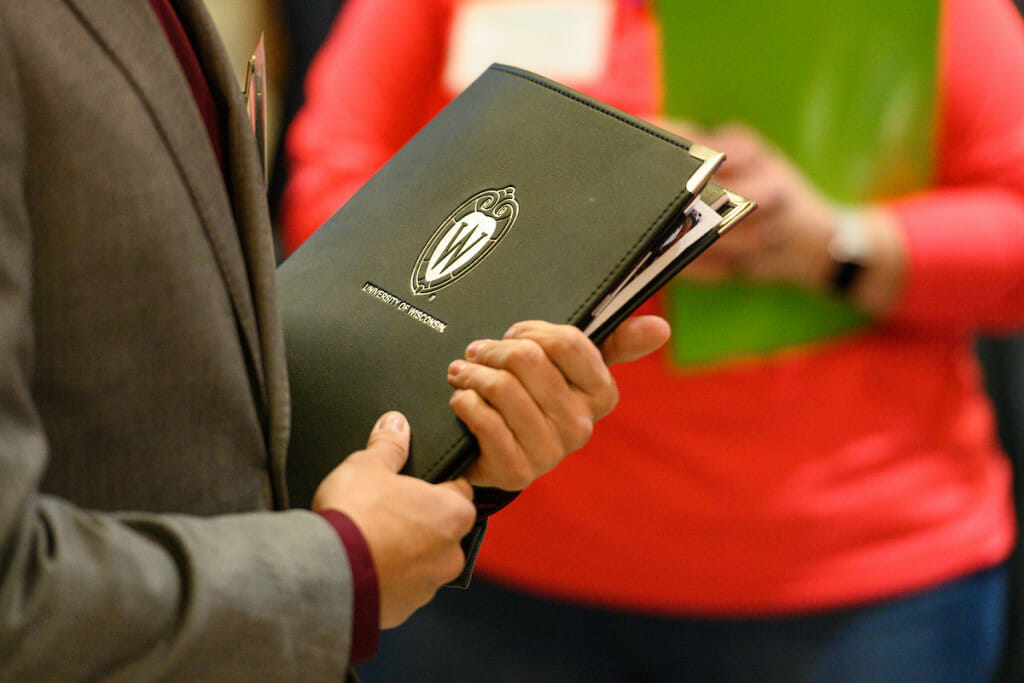
A student talks with a recruiter during the annual Spring Career and Internship Fair held at the Kohl Center on Feb. 5, 2019. Photo: Bryce Richter
When it comes to helping Wisconsin residents and the state’s economy, you Can’t Stop a Badger. This February, see how our students get a career-ready education from day one. Follow along using #CantStopABadger on social media. Your support can help us continue this work.
New University of Wisconsin–Madison graduates have great success in the job market, with 71 percent of those seeking jobs getting an offer by the time they graduated in 2021-22, according to the First Destination survey.
Many new UW–Madison graduates also continue their education via graduate or professional school enrollment after completing their bachelor’s degree.
The students’ success reflects their hard work and achievement, along with the University’s commitment to preparing students with the skills that employers need.
“When employers raise an area of concern, like students needing greater exposure to a specific 3D modeling program, we bring that industry feedback to our academic departments,” says Stephanie Salazar Kann, College of Engineering career services associate director.
Here we highlight the work done in Business, Nursing and Engineering to prepare students to land their first jobs.
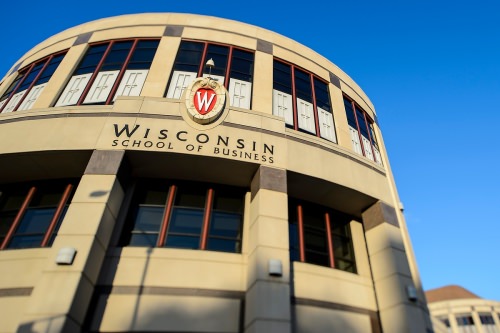
Grainger Hall, home of the Wisconsin School of Business. Founded in 1900, the school established one of the first five business programs in the nation. Photo: Jeff Miller
Wisconsin School of Business: career exploration
The Wisconsin School of Business’s Career Forward program provides undergraduate students with holistic career exploration and development support, according to Melissa Leffin, director of career engagement, and Brett Jones, director of employer engagement in the school’s undergraduate programs. Students have access to one-on-one career coaching; experiential opportunities like career treks, job shadowing and case competitions; and on- and off-campus recruiting events with employers.
Recruiting roadmaps and an interactive tool called Suitable help students navigate the School’s 40+ career pathways and ensure that they are becoming competitive candidates for their ideal internships and jobs.
“The School’s Career Engagement team also leverages data, student feedback, and other insights to identify and support trends in student career interest,” says Leffin. “We work proactively to pursue new industry and alumni partnerships in geographical markets and career pathways that are in high demand.”
Jones says employers recruit at WSB because of the well-rounded students the School produces.
“They are seeking students who have deep business acumen in their major and discipline, an analytical approach to problem solving, creativity, collaboration, and inclusive leadership,” says Jones.
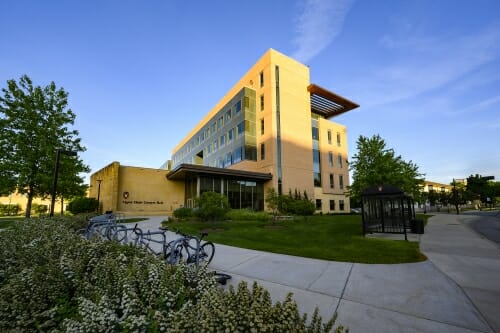
Signe Skott Cooper Hall, home to the School of Nursing. Photo: Bryce Richter
School of Nursing: clinical training is key
Graduates from the nursing school benefit from a high need for nurses, said Kelli Richards, Career Development & Learning Support Manager, and the the nursing major provides students with a professional certification.
Nursing students do clinical rotations as part of their degree, many at UW Health, the Madison VA and SSM Health.
“That helps in a few ways,” says Richards. “Students work with professional nurses and come in contact with nurse managers, which solidifies what they want to do a bit more. Also, they have those contacts to go through the job application process.”
Many hospitals and clinics hire students in student nurse roles or externships, because students receive enough clinical training that after their first semester in the nursing program, they are qualified to hold those roles.
“Those jobs pay well, unlike unpaid internships or other summer jobs, and they can work 8-12 hours a week during nursing school or full-time in the summer, and test whether a hospital or clinic is a good fit for them,” says Richards.
Nursing school staff prepare students to take their licensing exams in June after graduation and also hold career programming events weekly to talk about licensure and career-related topics. Richards says the school has strong relationships with recruiters and a dedicated alumni base that regularly returns to campus to mentor students through the school’s alumni mentorship programs and alumni panels. Richards also provides one-on-one appointments for students to come chat about their career plans and licensure.
Nursing students complete as many as five or six hospital, clinical, and public health rotations in their last two years of school and can express preferences for certain areas, like pediatrics or surgery.
“During their first year, they’re usually working at UW Health in a variety of units, being led by a faculty member,” says Richards. “Their last year in the nursing program, they work directly with an RN who is their preceptor, gaining autonomy. That helps them figure out what they want to do, and then if they interview in an area where they have clinical experience they can talk about that.”
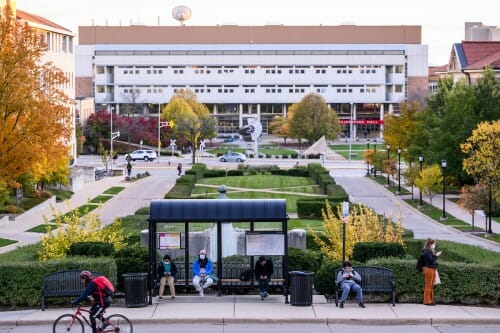
Engineering Hall is the backdrop for a peaceful scene. Photo: Jeff Miller
College of Engineering: meeting employers early
The College of Engineering offers hands-on, well-defined majors that prioritize work-based experience, cooperative education, and internships, says Stephanie Salazar Kann, Engineering Career Services Associate Director. Opportunities to do research and get hands-on experience in makerspace lab areas builds students’ academic and technical acumen.
“Employers often tell us they’re looking for students who can work in teams, think critically with others, and communicate with a variety of individuals with different backgrounds,” says Salazar Kann. “Students practice those skills from their Introduction to Engineering courses all the way to their senior design capstone courses and labs.”
The College of Engineering hosts job fairs each semester, where well over 300 employers from local, regional, and national organizations come to campus to recruit engineering students. Undergraduates have the opportunity to meet employers very early in their academic careers, learn about potential jobs directly from the people they hope to work for one day, and stay in touch.
College of Engineering staff ask employers who hire students for summer internships and co-op positions for feedback on students’ skills. Staff want to know if students are regularly demonstrating the ability to make engineering judgements; apply design to produce solutions that meet specific societal needs; communicate effectively on teams; and recognize their ethical and professional responsibilities.
“Across the board, our students meet and exceed employers’ expectations,” says Salazar Kann.
Part of the appeal for students coming into engineering is that they gain such exposure to the latest technology.
“They are the builders and creators of advances that we all use and experience every day, and employers appreciate that,” she says. “That skill set is a way of learning, thinking, and problem solving that allows them to continue to pivot with time and changes. Students don’t necessarily reflect on that right away, but later, they realize their bachelor’s level degree is still keeping their career going even if things are changing.”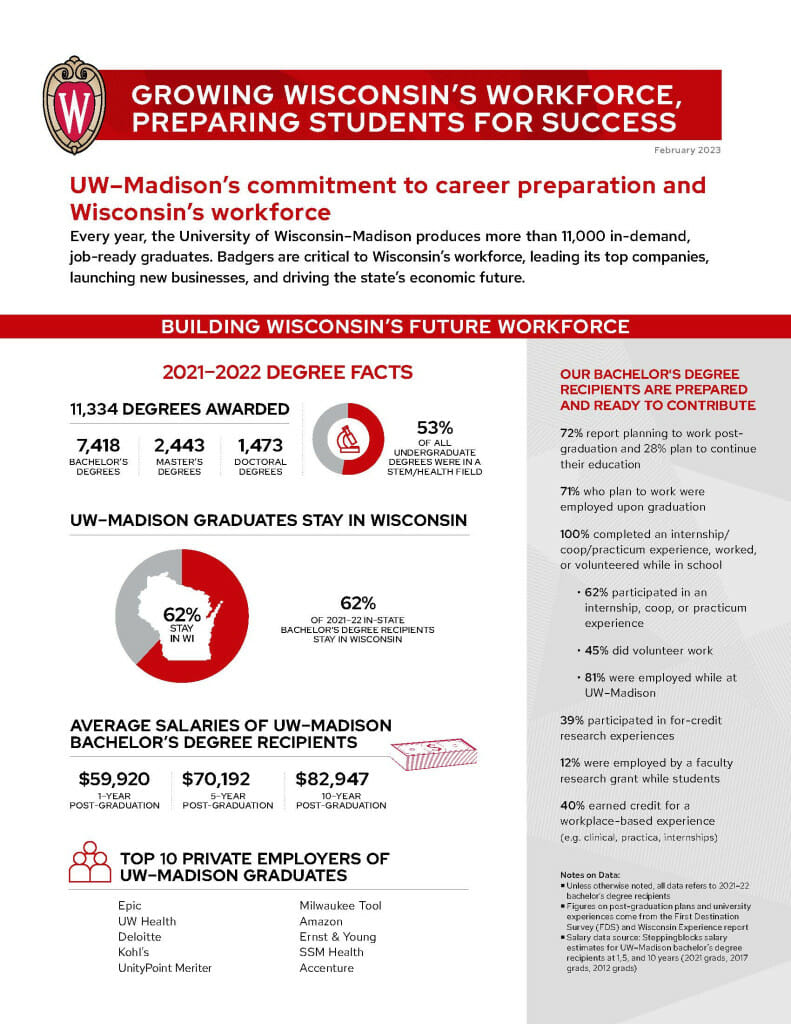
Next week: SuccessWorks helps College of Letters & Science students match with careers.
Enjoy this story?
Read more news from the College of EngineeringSubscribe to Wisconsin Ideas
Want more stories of the Wisconsin Idea in action? Sign-up for our monthly e-newsletter highlighting how Badgers are taking their education and research beyond the boundaries of the classroom to improve lives.
